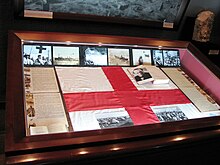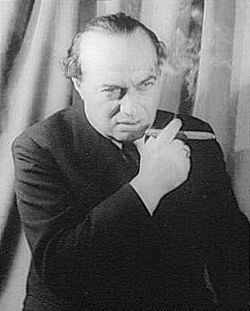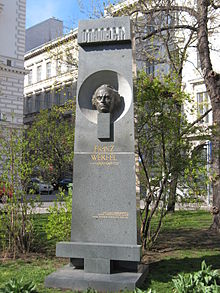The forty days of Musa Dagh
The forty days of Musa Dagh is a historical novel by the Austrian writer Franz Werfel , published in November 1933 , in which the genocide of the Armenians and the Armenian resistance on the Musa Dagh under the leadership of Moses Der Kalousdian are processed in literary terms .
Origin and impact history

In 1929 Franz Werfel traveled with Alma Mahler via Cairo to Jerusalem and on to Damascus . Their guide showed them the city's great mosques and department stores. So they finally ended up in the largest carpet weaving mill in town. During the tour of the large property, they noticed starving children everywhere doing auxiliary work. When she asked the factory owner, he replied: “Oh, these poor creatures, I pick them up on the street and give them ten piastres a day so they don't starve to death. They are the children of the Armenians who were slain by the Turks . If I don't put them here, they'll starve to death and nobody cares. They cannot afford the slightest thing, they are too weak for that ” . On their further journey to the Lebanese mountains they saw many Armenian villages, which differed from the Turkish settlements in their cleanliness and flowers. Franz Werfel was so moved by the injustice inflicted on the Armenians that he sketched the idea of a novel while he was there. In order to find out the historical details, he had the envoy, Count Clauzel, send him all the protocols from the Paris War Ministry on the Turkish atrocities from that time. The book was written in the period from July 1932 to March 1933. On a lecture tour in various German cities in November 1932, Franz Werfel selected the fifth chapter of the first book for a lecture. The novel was banned in Nazi Germany in February 1934 on the basis of Section 7 of the presidential decree for the protection of the German people because of “endangering public safety and order”. Werfel himself was excluded from the Prussian Academy of the Arts in the year the novel was written. The novel was received with great enthusiasm by the Armenians living in exile. On a trip to America in 1936, Franz Werfel was celebrated by the Armenians in New York. In an Armenian church a priest said during a sermon: "We were one nation, but only Franz Werfel gave us a soul."
The German Bundestag , the parliament of Germany, described the massacre of the Armenians in the Ottoman Empire in 1915/16 as genocide on June 2, 2016 . The Turkish President Recep Tayyip Erdoğan has heavily criticized this decision.
content
The novel is divided into three books.
First book: "The approaching one"
First chapter
Teskeré
It is the spring of 1915. Turkey is in alliance with the Central Powers at war against the Triple Entente . For the Armenian residents of the village of Yoghonuluk and the surrounding villages, which lie below the Musa Dağı Mountain , the impending disaster for their community is looming when the domestic passes, the Teskeré, are confiscated by the local Turkish police officers, the Saptiehs. The Bagradian family have recently become residents of the village. Gabriel Bagradian, 35 years old, left the village 23 years ago, lived in Paris and has now returned with his wife Juliette, a French woman, and their son Stephan, 13 years old, for a short stay at the property of his late grandfather. Gabriel is a reserve officer in the Turkish army.
second chapter
Konak Hamam Selamlik
During his investigations in Antioch in the office of Müdir, the chief of the district, Bagradian received no official explanation for this measure; in further encounters with Turkish administrative officials, however, he senses the hostile sentiment against his people. An old Turkish family friend, the Agha Rifaat Bereket, advises him to stay in the village and be silent. He himself will stand up for the Armenian residents of the villages in Istanbul .
third chapter
The notables of Yoghonoluk
The Armenian villages are well cared for. Its residents are famous for their artistry. They carve ornate objects out of wood and horn, sew cloths with fine tips, spin silk and obtain the best honey from the bees of Musa Dağı. The Bagradian family estate is just outside the village. The dignitaries of the village have gathered there. These are the Protestant pastor Nokhudian with his wife, the Muchtar (mayor) of Yoghonuluk with his wife, the teachers Schatakhian and Oskanian as well as the pharmacist Krikor, who is the only one in the village with a large library, and the old doctor Altouni with his wife, who are responsible for the medical care of the villages. They are full of admiration for their host Juliette Bagradian. There is no serious talk about the impending danger. A young man with an American passport, by name Gonzague Maris, plays a few pieces on the piano before the company breaks up. Gabriel says nothing of his fears. In a conversation during the night, however, he advises his wife to divorce him and flee to France. Juliette cannot understand these statements at all. She doesn't believe in the danger and wants to stay with him.
Chapter Four
The first event
While Juliette is enjoying the many new tasks at the country estate, Gabriel explores the villages and the landscape. He is becoming more and more aware of his Armenian nature and his solidarity with the rural Armenian people. He collects information about the population and meets with those responsible. In a conversation with Ter Haigasun, the main Gregorian priest, he learns of the arrest of the Armenian educated people in Istanbul. In April the Protestant pastor Aram arrives in the village from Zeitun with his pregnant wife, his seriously injured sister Iskuhi and the orphan Sato . They were deported along with all the Armenian residents of the city of Zeitun, but were able to flee. They had to leave behind the orphans whom they were recommended to have. Pastor Aram Tomasian insists time and again: “Don't think about the old massacres! It's much worse, much sadder, much more relentless than any massacre, and above all, much slower. It stays day and night ... ” A few days later the governor of the province, Wali Djelal Bey, who was always well-disposed towards the Armenians, is retired by the Ministry of the Interior.
Fifth chapter
Interlude of the gods
Pastor Johannes Lepsius , a German clergyman, tries to persuade War Minister Enver Pascha in Istanbul not to undertake any further deportations of Armenians. The Minister of War is silent on this. The pastor leaves the government building without hope, and in fact Enver Pascha does not contradict his interior minister Talaat Bey when he sends the telegrams with the deportation instructions for the western vilayet (provinces) of the Ottoman Empire.
- Pastor Lepsius himself reports in the foreword (pp. XII-XVIII) of his Book of Armenia about the audience with Enver Pascha.
Sixth chapter
The great gathering
Gabriel explores the Musa Dağı and makes precise maps. During his conversations with the villagers, he met Tschausch Nurhan, who among other things runs a locksmith's shop and understands the weapons trade. He learns from the mayor of the village that a large number of rifles that the village had received from the Young Turks in 1908 for the uprising against the Sultan are hidden in the cemetery. Meanwhile, Juliette befriends Iskuhi. Stephan is also very impressed by the guests. It was Sunday, July 24th, when Bagradian learned from the Turkish village policeman that the inhabitants of the seven Armenian villages were to be deported in ten days. Ter Haigasun, the chief clergyman, has already called the mayor to him. It is decided to call a meeting of all residents in front of Villa Bagradian that afternoon. Before the meeting, Bagradian explains his plan to move with all the villagers to the Musa Dağı and to defend it against the Turkish police. He raised his hand as if in an oath: “I undertake here before you to conduct the defense in such a way that our women and children are saved from death longer than they were when they were deported. We can hold out for several weeks, even months. ” There is a vote. Hundreds of people decide to go into exile with Pastor Nokhudian. The rest of them vote to defend themselves on Musa Dağı. In a written vote, the leaders are elected from the more than 4,000 gathered. Most of the votes fall on Ter Haigasun, the chief clergyman; Doctor Altouni follow, then the seven muchtars (mayors) and the three village priests. Furthermore, the pharmacist Krikor, some teachers, Bagradian, the old "building contractor" Tomasian and Tschausch Nurhan, the long-serving sergeant, are elected to the leadership council.
Seventh chapter
The burial of the bells
Bagradian is in charge of the defense. He immediately went up the mountain with a hundred people, had trenches dug, set up the camp and did military service. When the Saptiehs appear in the villages and the villa under the leadership of the police captain and Müdir, all residents are back on site. Except for a few murders and rapes, the day went off lightly. The residents of the villages are given three days to pack their belongings before the "relocation" begins. Mounts and carts are not allowed. After the policemen have left the villages, a large supplication service takes place in the church. The bells of the church are lowered, brought to the cemetery in procession and "buried". Earth is being loaded from the edge of the cemetery in hand-made paper. It is supposed to give believing Christians the opportunity to bury their dead on the Musa Dağı in consecrated earth. Then the families say goodbye to the graves and return to their villages. On the night of July 31, all families who are ready are supposed to move up to the mountain.
Second book: "The struggles of the weak"
First chapter
Our apartment is the mountain height
For 1000 families, at the height of the Musa Dağı in the so-called "town hollow", leaf huts are being built. An altar place will be set up and a community center with several rooms will be created. Juliette is allowed to live in the hunting tents on the Dreizeltplatz and decide for herself with whom she wants to share it. Bagradian explains: “My wife also has the right to live her own life here on Damlajik ... She is French, a stranger, a child of happier peoples, forced by fate to share in our sufferings. She will therefore enjoy the generous hospitality of our people. ” After long discussions, all residents are ready to share the food available - especially the goats and sheep. When a war-strong Turkish company tried to take Musa Dağı in a supposedly simple police operation on August 4th, it was defeated by the well-prepared Armenians.
second chapter
The deeds of the boys
The second attack took place on August 13th. He's better prepared. The gunfire initially surprised the defenders. However, they manage to hit the attackers on the south side with a cleverly triggered stone avalanche and, thanks to the well-prepared position on the north side, they can repel the enemy in a counterattack. When the attackers retreat into the villages at night and leave the two guns behind on the other side of the mountain under little guard, the young people manage to scout out this position. Their two leaders, Haik and the young Stephan Bagradian, kill the guards or drive them to flight. So both guns get into the hands of the defenders. While Bagradian is busy organizing the defenses day and night, his wife Juliette, who works by the hour in the hospital, made friends with Gonzague Maris.
third chapter
The procession of fire
Howsannah, the wife of the Protestant pastor Aram Tomasian, gives birth to a boy; he is baptized in the name of Mikael. Gonzague and Juliette are getting closer and closer. He wants to flee with her to Antioch . But she can't make up her mind. Gabriel Bagradian, for his part, feels drawn to Iskuhi. The Turkish military is gathering new troops around the Musa Dağı. With almost 2,000 men of regular infantry and 3,000 men of armed auxiliaries, they attempt a new attack. The shell fire from the two howitzers, which are adjusted by Bagradian, brings the attackers first losses and creates great confusion. When the defense on the north slope hesitates too long under their leader, the former deserter Sarkis Kilikian, the Turks manage to conquer the defensive lines and establish themselves. During the night, the besieged ignite a sea of flames on the Musa Dağı with branches dipped in petroleum and start a counterattack. The Turkish troops are defeated in a bitter hand-to-hand combat and have to retreat into the valley. The Armenian defenders stole more than 200 rifles, ammunition, cooking boxes and pack donkeys with provisions.
Chapter Four
Sato's ways
The fighting left 113 dead and many seriously injured. The fire spreads heat and acrid smoke on the mountain for days. On August 25, Kilikian was sentenced to five days in prison for misconduct. On August 26th, two young people are selected to bring a letter of support to an English, French, American or Italian warship in the Bay of Alexandrette . As the third young person, Haik is selected with the task of delivering a similar letter overland to the American embassy in Aleppo .
A pronunciation of the Bagradian couple fails. Juliette, who is still secretly seeing Gonzague, is infected by a feverish virus from her work in the hospital. When Juliette and Gonzague are surprised by the council at a love meeting, Juliette faints. Gabriel carries his wife to the hospital without paying any attention to the lover. After a certain amount of mistrust, the doctor realizes that she is indeed infected with the life-threatening virus. Iskuhi and Gabriel care for the sick together. Gabriel and Iskuhi sat in silence, pressed close together and hand in hand on the divan. But he did not keep an eye on the patient. Strangest involvement in life! The betrayed served the deceiver - cheating her with another. Gonzague has to leave the camp and the mountain. Tied into their personal worries and duties, the Bagradians neglected their supervision of Stephan. So they didn't notice that he left the camp.
Third book: "Downfall - Rescue - Downfall"
First chapter
Interlude of the gods
Pastor Lepsius succeeds in convincing influential Orthodox Muslim clergy that it is injustice what is happening to the Armenians. Those responsible declare themselves ready to do what they can to help the Armenians.
second chapter
Stephan's departure and return home
After Stephan has found Haik, they walk together towards Aleppo. But when Stephan falls ill with a fever, Haik has to leave him behind. A well-meaning Turkish farmer brings Stephan back near the Musa Dağı. Stephan lost his way through the fever without a sense of direction. He is picked up by the Turkish military and killed as an alleged spy. The mourners find the dead man and take him up the mountain.
third chapter
The pain
At Pastor Aram's idea, young people try to catch fish off the cliffs on a raft and equipped with trawls. The yield remains very small. His wife Howsannah urges him to urge his sister Iskuhi to stay away from Gabriel Bagradian. He then speaks to his sister. She replies calmly and firmly: "Nothing happened between me and Gabriel Bagradian ... But I love him and will stay with him until the end!" When Stephen's body is brought to the altar square, Gabriel leaves his head without shedding tears sink on his son's face. Without resistance, he then lets Ter Haigasun and Bedros Hekim lead him to the Dreizeltplatz. He doesn't say a word and Iskuhi helps him undress and lie down. His teeth chatter and the chills plague him. Juliette, however, is lying next to it, feverish and does not learn anything of the death of her only son.
Chapter Four
Decay and temptation
The Agha Rifaat Bereket has been allowed by the military to speak to those trapped on the mountain. He brings the Armenians a letter from Pastor Harutian Nokhudian to Ter Haigasun, but he offers Gabriel Bagradian the opportunity to escape unrecognized with him in exchange for one of his companions. Gabriel is not ready for this deal. He replies: “It was I who gave the seven churches the idea to go to Musa Dagh. ... I am and will be the one responsible, the culprit, when in a few days yours will torture everything alive in this camp, even the sick and infants, to death. What do you mean agha? Can I just run away? ” The pharmacist Krikor dies the following day.
Fifth chapter
The altar flame
The next day, the thirty-fourth day of exile, 43 people died by evening. Their corpses are thrown over the cliffs into the sea. Because of the poor food situation, injuries and general exhaustion, an ever increasing number of sick people are dying. There is a riot. The former deserters, who are among themselves in the south bastion, seize weapons and food in the main camp and at Dreizeltplatz under the direction of Kilikian. They want to try to break out of the siege. Parts of the camp catch fire. In the general commotion there are dead and injured. But after a few hours the men give up and bring Kilikian back to the altar square, tied up.
Sixth chapter
The writing in the fog
On the morning of the fortieth day of defense, the Turkish besiegers open cannon fire to storm the mountain. But in the meantime a French naval association, which was on the way to Egypt, became aware of the mountain through the reflection of the fire and has approached the coast. The French warships open fire on the Turkish besiegers. In order to avoid another conflict, the Turkish troops withdraw. The Armenians can save themselves on the warships with their sick and wounded.
Seventh chapter
The inexplicable in us and above us
Gabriel Bagradian is left alone on the mountain unnoticed and falls asleep in a quiet place. When he wakes up, he sees the fleet cast off. He remains perfectly calm and inexplicably makes no move to attract attention, but climbs the mountain and finally goes to his son's grave. The second Turkish ball crashed through his temple. He clung to the wood, dragging it with him in his fall. And the cross of the son was on his heart.
Reception within Judaism
The book was praised by many Jews who saw in it allusions to Judaism and Israel. Musa Dagh is often compared to the resistance in the Jewish ghettos during World War II. One of them, the Bialystok ghetto , found itself in the same situation as the Musa Dagh. In February 1943 Mordechai Tenenbaum was sent from the Vilna Ghetto to organize the resistance in Bialystok. From the recordings of the meetings: “Only one thing remains for us: to organize the collective resistance in the ghetto, at all costs! To see the ghetto as our Musa Dagh, in order to write an honorable chapter in history for the Jewish Bialystok and our movement! ”Said Tenenbaum.
Copies of the book went from hand to hand among the ghetto defenders, who compared their situation with the Armenians. After extensive statistical records by Hermann Kruk in the Vilnius ghetto library, this book became the most popular among the ghetto readership, as is reported in the memoirs of survivors who worked in the library.
In 1942, many Jews in the British Mandate of Palestine considered retreating with defense on Mount Carmel because of a possible Nazi invasion of the region. Named as the “Northern Program”, “Carmel”, “ Massada ” or “Musa Dagh Plan”, it was intended as a bulwark against the Nazi attacks. Meir Batz, one of the leaders of the Jewish militia, who had also read the novel, stated that the community wanted to convert the Carmel into the Musa Dagh of Palestinian Judaism ... “We put our trust in the strength of the Jewish Musa Dagh and were determined to endure for at least three to four months. "
particularities
A specialty lies in the choice of name Franz Werfels. The name Bagradian is based on the ancient Armenian royal family of the Bagratids .
There is historical evidence of the resistance at Musa Dağı by the German consul in Aleppo, Walter Rößler . In the report on the situation of the Armenian people in Turkey of Johannes Lepsius , the event is mentioned:
“A crowd of 4058, including 3004 women and children, were able to flee to the Jebel Musah from villages near Suidije on the outflow of the Orontes. He was picked up on the coast by a French cruiser and taken to Alexandria. "
expenditure
-
The forty days of Musa Dagh. First edition in two volumes:
- Volume 1: The approaching . Zsolnay, Berlin 1933.
- Volume 2: The Struggles of the Weak . Zsolnay, Berlin 1933.
- The forty days of Musa Dagh. Two volumes, Forum Exilverlagsgemeinschaft, Bermann-Fischer, Allert de Lange and Querido, Netherlands. 1935.
- The forty days of Musa Dagh. Aufbauverlag, Berlin 1955, DNB 550357955 (license from Fischer Verlag Frankfurt am Main: “Edition for socialist countries”).
The forty days of Musa Dagh. Fackelverlag, Olten-Stuttgart-Salzburg, 1969, licensed edition
- The forty days of Musa Dagh. Fischer, Frankfurt am Main 1997, ISBN 3-10-391008-8 ; Fischer Taschenbuch, Frankfurt am Main 1990, ISBN 978-3-596-29458-9 ; 2006, ISBN 978-3-596-17211-5 , ISBN 978-3-596-90362-7 .
literature
- Roy Knocke, Werner Treß (ed.): Franz Werfel and the genocide of the Armenians . Walter de Gruyter, Berlin / Boston 2015.
- Medsi Pirumowa: The genesis of the novel The Forty Days of Musa Dagh . In: Karlheinz Auckenthaler (Ed.): Franz Werfel. New aspects of his work . Szeged 1992 (Acta Germanica 2), pp. 91-97.
- Kemal Cicek: The Armenians of Musa Dagh 1915-1939, A Story of Insurgency and Flight, Turquoise Series, Haarlem / Netherlands 2020, ISBN 978-90-6921-021-6
- George Schulz-Behrend: Sources and Background of Werfel's Novel The Forty Days of Musa Dagh . In: Germanic Review 26 (1951), pp. 111-123.
Web links
- Stefan Karsten: The genocide of the Armenians in novels by Werfel, Hilsenrath, Mangelsen and Balakian. partly online from google books .
- Volker Hartmann: Religiosity as Intertextuality. Chapter (30 p.) About the novel online from google-books .
- Yair Auron: The banality of indifference: Zionism & the Armenian genocide. Chapter 7: Symbol and Parable - describes the contemporary Jewish reaction to the book in Israel and in the ghettos partly online from google-books
- Map with front line
- Peter Stephan Jungk , on the posthumous award of the Armenian honorary citizenship to Franz Werfel in 2006 in Vienna, lecture .
Individual evidence
- ↑ quoted from: Alma Mahler-Werfel: My life . Deutscher Bücherbund, p. 223
- ↑ Alma Mahler-Werfel: Mein Leben , Deutscher Bücherbund, p. 225
- ↑ Alma Mahler-Werfel :, Mein Leben , Deutscher Bücherbund, p. 275
- ↑ Helmut Uwer, Gerd Höhler: The Turkish leadership is outraged , in: Salzburger Nachrichten newspaper , No. 127, Salzburg, June 3, 2016, p. 4
- ↑ The Passage of the Armenian People: Report on the Fate of the Armenian People in Turkey during the World War . Potsdam 1919; read google books online (with us proxy!)
- ↑ Wolfgang Gust (ed.), The genocide of the Armenians 1915/16, documents from the political archive of the German Foreign Office, p. 351; also mentioned in Consul Rößler to the Reich Chancellor
- ↑ Johannes Lepsius : Report on the situation of the Armenian people in Turkey . Unchangeable New edition with original text of the 1916 edition, Bad Schussenried 2011, ISBN 978-3-87336-368-7 , p. 137



